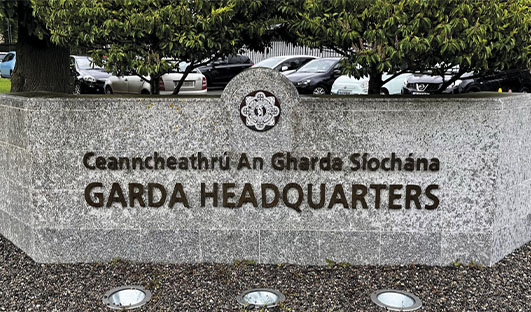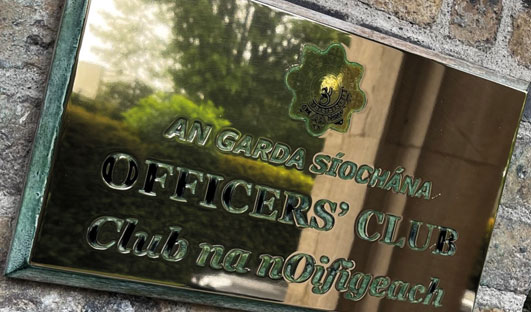Garda Commissioner Drew Harris: A tried and tested policing model

In the context of the implementation of a new operating model, alongside the imminent introduction of the Policing, Security and Community Safety Bill, Ciarán Galway visits An Garda Síochána’s (AGS) Phoenix Park headquarters to discuss culture, reform, and reflection with Garda Commissioner Drew Harris.
Beginning a five-year term as Garda Commissioner in September 2018, Drew Harris’ contract was subsequently extended – by two years – until June 2025.
In 1983, at the age of 19, he joined the Royal Ulster Constabulary. Six years later, the Provisional IRA killed his father, Alwyn Harris, who was also an RUC officer. Appearing on The Late Late Show in 2021, he reflected on his loss, asserting: “In lots of ways it has had a profound effect on my outlook as to what policing should be… and what we should do for those who are without a voice or might be marginalised in society.”
Ultimately, Harris garnered 34 years of policing experience, principally in the North, with two years secondment in Scotland. By 2006, he had risen to the rank of Assistant Chief Constable responsible for Crime Operations with the Police Service of Northern Ireland (PSNI), and in 2014 he was appointed Deputy Chief Constable.
Harris’ appointment marked a departure for An Garda Síochána. It was the first occasion in which the new appointment process, managed by the Public Appointments Service on behalf of the Policing Authority, had been deployed and he became the first individual from outside the State to be appointed Garda Commissioner.
During his time as Assistant Chief Constable, Harris had responsibility for intelligence within the PSNI, including responsibility for the interface with the Security Service, or MI5. As such, his remit included “all covert operations relating to national security and crime”, as well as “the majority of the covert intelligence sources who would report in respect of national security matters”.
Ultimately, the appointment caused some unease at the time, not least within policing circles, with one former Chief Superintendent telling RTÉ: “I know of no State security organisation, and I’m really familiar with that field, in Europe or elsewhere, that would do it that particular way.”
Regardless, when, in June 2018, the Government announced the appointment, then Minister for Justice Charlie Flanagan TD asserted: “Drew takes up office at a time of major reform and investment which will redefine An Garda Síochána as an organisation. As we approach the centenary of the establishment of An Garda Síochána, the organisation is on the cusp of significant change.”
Transition
Widely caricatured as ‘the outsider’, Harris did not find his transition from Belfast to Dublin – from the PSNI to AGS – “as big a challenge as you might think”, certainly not culturally. Although he does allude to some operational contrasts, acknowledging that “it happens in a somewhat different context”.
“I was well steeped in a tradition of policing,” he begins, adding: “This is police work, in the end. There were things that I wanted to do but also things that you wanted to respect, build upon, and enhance.”
Emphasising his determination to identify An Garda Síochána’s strengths, “rather than throwing everything into the change bucket”, the Commissioner focuses on public confidence. “When you look at confidence in us as a policing service, it is very strong. What we look to all the time is what could threaten that and what should we do in order to mitigate those threats, or indeed counter them, and enhance confidence in the service,” he reveals.
Commonalities
One commonality – which is reflected across Europe – is a steady increase in crimes which include domestic abuse, child abuse, online child abuse, serious sexual assault, and, most recently then, the rise of cybercrime. “Those challenges are consistent. We have moved more from crimes of acquisition – where there had been a huge concentration – across to crimes which can often happen in a more private space. It is more difficult to get a handle on, there are huge issues of underreporting, and the more we invest in it and talk about it, obviously, we will get more reports about it,” he says.
Simultaneously, the Garda Commissioner is cognisant of the globalised challenge around visibility and public confidence in policing. Referencing the 2020 murder of George Floyd in the US, alongside policing scandals in the UK and Europe, as illustrative of just how quickly confidence can be eroded, he asserts: “An important part of our role is looking out to see what the trends are elsewhere, how we can learn from them, and how to adapt quickly.
“What people say about policing in America or London, such is our interconnection, some of it driven by social media etcetera, that it reflects into us as well. There is no way of avoiding that. That might not have been case 20 years ago, but it certainly is now.”

Unique
In spite of the often-globalised nature of policing, Harris identifies several characteristics exhibited by An Garda Síochána which have long since dissipated elsewhere. “We have kept doing things which have stopped in a lot of jurisdictions, including smaller stations, the schools programme, even the roads policing. These are things which, certainly in Great Britain, have pretty much withered on the vine. We have kept them going here and to is to our strength as well,” he relates.
While stressing the cliché of gardaí as a loadstone of local communities, the Garda Commissioner also underscores his organisation’s unitary policing structure. “We do everything from community policing right up to organised crime, countering the threat from terrorism, and indeed then we have a national security responsibility as well, which is tackling the threat of espionage from hostile state actors,” he notes.
As well as being a distinct among neighbouring policing organisations, it ensures a “golden thread of information within the organisation”, which Harris identifies as a strength. “We are not in silos. Where other jurisdictions might give national or international crime work to some other agency, that always creates a difficulty around demarcation of information and investigations. We avoid a lot of that because we are all on one piece of turf and, therefore, avoid the turf wars. That is good.”
Operating model
Published in September 2018, the Report of the Commission on the Future of Policing in Ireland was followed by a four-year implementation plan, A Policing Service for our Future. Now, in its third iteration, one major component of the plan is the implementation of a new organisational operating model.
Enacted in May 2022, the general scheme of the Garda Síochána (Functions and Operational Areas) Act 2022, provides for the implementation of this new operating model, defined by Garda divisional structure. Designed to liberate specialist gardaí from back-office functions, the new divisional policing model will ensure that services pivot to divisional level. In practice, this means that the 19 Garda divisions will act as the lynchpin for day-to-day policing delivery across four Garda regions.
With the first live rollouts of the new operating model timetabled for the coming months, Harris outlines: “The divisions are the units by which we deliver policing. We have enlarged them so that they are substantial commands in themselves and a good deal more self-sufficient.
“We are going to delegate more responsibility to the divisional officers, the chief superintendents.”
Indicating that the previous operating model was not resilient enough “to cope with some of the specialisms that are needed at local level”, the Commissioner emphasises the need for divisional structures to deliver service provision that is both attentive to local requirements and sufficiently strong to ensure operational resilience.
“I want operational autonomy, within a corporate framework, for those divisional officers. They need to be able to make operational decisions locally and be then supported by the regional structure and the national structure in doing that; and that is specialist resources or additional resources as needs be.
“That is where we are going. It is a well tried and tested policing model actually that evolved in a lot of other countries other than Ireland,” he insists.
Legislation
As a priority in the Programme for Government, the Department of Justice has included reform of An Garda Síochána among its primary goals. Indeed, in February 2022, Justice Minister Helen McEntee TD signalled: “[An Garda Síochána] is currently entering a critical phase with the rollout of the new operating model, and the forthcoming passage and implementation of the Policing, Security and Community Safety Bill.
Once enacted, the Bill will provide for the enhancement of “the governance of An Garda Síochána and to provide for clear and effective oversight and accountability”. Criticising the proposed legislation in a submission to the Oireachtas Committee on Justice, Harris wrote: “As it is currently drafted, the scheme falls well short of our shared ambition for a transparent, accountable, trusted and effective policing service for the future.”
Responding, therefore to the suggestion that there is some disquiet within An Garda Síochána at the prospect of the new legislation, the Commissioner reflects: “We have had the opportunity to contribute to legislation and to make suggestions etcetera. We have been afforded that both through the committee stage but also in our dealings with the Department [of Justice]. That has happened.
“That is the process you follow through; exercise your voice and then as with all these things, there is a balance, and we will follow through with the implementation of what the legislation ultimately turns out to be.”
“It is a human condition, particularly in an endeavour such as policing, that things will go wrong, and mistakes will happen. That is opportunity to learn. But malfeasance in a public office, such as being a member of An Garda Síochána is a different matter…”
Garda Commissioner Drew Harris
Culture
Reflecting on the challenges of implementing change in a large public sector organisation, the Commissioner defines himself as “behaviouralist”. Discussing the influence of behaviour on culture, he impresses the importance of consistency.
“The one thing that is required from me is consistency of the message. That consistency of the message must also be reflected in what we do and the decisions that we take so that there is no disparity between what we are saying, what we are doing, and the direction that we are going.
“There is a huge amount written about cultural change, but I do think it is a little bit simpler than some would say,” he proposes.
Discipline
Meanwhile, having called into question the morale within An Garda Síochána during his address at the annual Garda Representative Association (GRA) conference in May 2022, outgoing GRA president Frank Thornton has advocated for a review of the Garda’s suspension policy.
With over 90 gardaí currently suspended pending investigation, and a further 90 resignations in 2021, the Commissioner has been variously characterised in the media as a “no-nonsense police officer” and as having a reputation as a “strong disciplinarian”.
They are not characterisations which Harris seeks to embrace. “The thing about discipline in a police service is, what is the alternative? Ill-discipline in a police service? That is not credible,” he insists.
“Discipline is about the behaviours that the public expect – and rightly expect – of a policing service. It is about behaviours, and it is about behaviours which are so beyond the pale in terms of malfeasance of whatever nature it might be, that they are going to erode public confidence in An Garda Síochána. That is not tolerable to me.
“I know people caricature it, perhaps without understanding it. I am not interested in pursuing people for mistakes. It is a human condition, particularly in an endeavour such as policing, that things will go wrong, and mistakes will happen. That is opportunity to learn. But malfeasance in a public office, such as being a member of An Garda Síochána, is a different matter and I regard that as being gross misconduct, in its various forms.”
Discretion
Commenting on Garda discretion, a concept supported by gardaí of all ranks, and the perceived threat posed to it by procedure, Harris acknowledges its importance in policing. “Discretion is important because that is a means of still building and keeping a positive relationship with the public. Everything is not being treated as an absolute matter,” he begins, adding: “We have moved from being, in effect, an output, figures, and performance type regime to a far more outcomes [-based organisation].
“What is the outcome that we seek to achieve? Simply put, it is keeping people safe. We want Ireland to be a safer place to live and work. If we concentrate on that, then ultimately, an element of our work will always be in respect of discretion. Rather than chasing figures, we are chasing the public good that we do.”

Centenary
Reflecting on the centenary year of AGS, Harris contends that as well as being a sign of the organisation’s success, it represents an opportunity for the future of policing. “Very few organisations actually do get to 100 years and so we want to celebrate that and celebrate the achievements,” he says, adding: “It is a good moment for us to set out what our manifesto is for the future, how we want to see policing develop here in Ireland.”
However, while paying tribute to and expressing his pride in the “very many great people who have donned the uniform and given really excellent service” and referencing the “very positive reputation” AGS enjoys internationally, the Commissioner accepts that the organisation has been embroiled in a significant number of controversial episodes.
“We know, as well, that not everything was as it should be. At times, things were very far from perfect, and we want to also acknowledge that and acknowledge that we have learned from those occasions, and want to keep moving forward,” he affirms
Challenges
Indeed, the current context of policing in Ireland is not without its challenges. For instance, the Garda Síochána Ombudsman Commission (GSOC) annual report for 2021 highlights a “sustained increase in the policing oversight body’s caseload” with a 12 per cent increase in public complaints made against AGS.
“A complaint system is essential for ongoing confidence in the organisation,” says Harris. Accepting that the context of some complaints is grave, for others, he argues, there is an opportunity for the member involved, if not the wider organisation, to embark on a learning curve.
“It is another form of feedback. Obviously, we would like to see complaints reducing, but in part, as the Minister said yesterday, it may be just the prominence of GSOC, but also the prominence that we have placed on proper behaviours by members of An Garda Síochána have encouraged people to come forward and report where they think those behaviours have fallen below standard.
“That gives us plenty to work on and we want to be positive in our relationship with GSOC. We have our own anti-corruption unit and are working internally as well, and we are not very far from implementing mandatory drug testing within the organisation. Even when we recruit, recruits will be subject to mandatory drug testing. There is a lot happening in that space,” he details.
Vision
Commenting on the two-year extensions to his contract, Harris succinctly remarks: “I was asked, and I was happy to say yes.” Overall, in respect of his vision for the organisation, the Commissioner outlines an ambition to “maintain our strengths around our community focus and how responsive we are to local communities”.
“We need to keep ahead of emerging crime trends. The big challenge for us and other police services is in respect of cybercrime which does not respect international boundaries. We, together with other offices, such as Europol and Interpol, need to use our scarce and finite resources in a far more coordinated way. That is a question of being there, being trusted partner, and cooperating in respect of that.”
Finally, Harris illustrates a desire for AGS to more reflective of the communities it serves. “Now, we are an organisation not just of Garda members, we also will have 4,000 Garda staff and that is another means by which we become more reflective of the society we serve. We are a big employer, we continue to recruit, there is still huge interest in joining An Garda Síochána, all of that is very positive.
“We just want to make sure that we keep that positive reputation and with that, public confidence. Public confidence means information, it means reporting, and those are absolutely vital to us in terms of mission around preventing and detecting crime. Public confidence really is our stock value and that is an important determiner of how successful we are as a police service,” he concludes.





